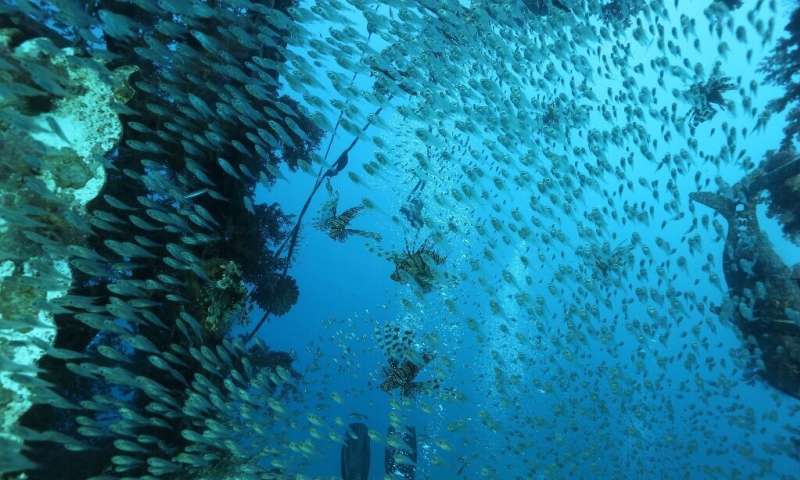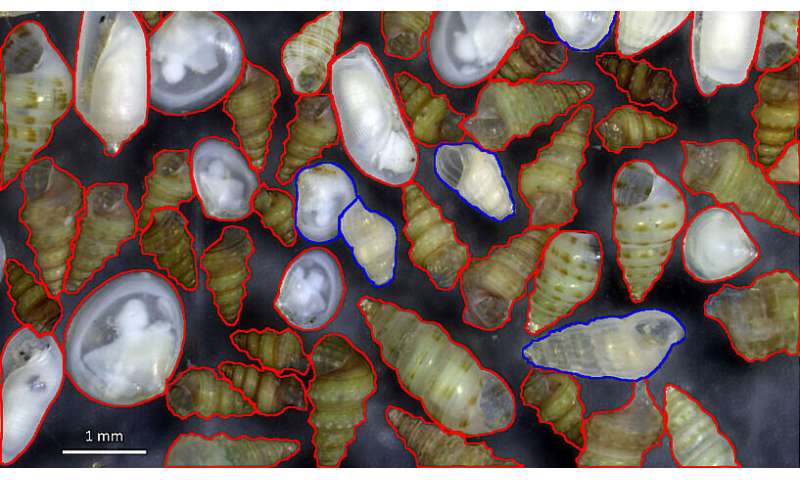#Warming driving Eastern Mediterranean species collapse: study

“#Warming driving Eastern Mediterranean species collapse: study”

Populations of marine molluscs have collapsed in recent decades in parts of the eastern Mediterranean as warming waters have made conditions unsuitable for native species, new research showed Wednesday.
The waters off the coast of Israel—among the hottest in the Mediterranean—have already warmed three degrees Celsius within four decades, with water temperatures regularly topping 30C (86 Fahrenheit) in summer.
An international team of researchers, writing in the journal Proceedings of Royal Society B, investigated the effect these warmer waters was having on local populations of marine molluscs, as well as the arrival of invasive species from the Red Sea via the Suez Canal.
Paolo Albano, from the University of Vienna’s Department of Paleontology, initially set out to contrast populations of local and non-native species along the Israeli shelf in the eastern Mediterranean.
But he quickly realised the extent to which local mollusc populations had declined.
“My expectation was to find a Mediterranean ecosystem with these ‘newcomers’,” he told AFP.
“However, after the first dive, I immediately realised that the problem was another one: the lack of the native Mediterranean species, even the most common ones that you would find everywhere in the Mediterranean.”

Local ‘eradication of species’
Albano and his colleagues compared mollusc populations identified from more than 100 seabed samples with historical records, finding that only 12 percent of the molluscs historically present in shallow sediment were still there.
On rocky reefs, that figure stood at just five percent.
The team also estimated that 60 percent of the remaining mollusc populations studied do not reach reproductive size, rendering the region a “demographic sink” for some species.
Albano said that while other factors could be playing a role in these population collapses, not least the impact of non-native species and pollution, the overall trend was likely caused by warming seas.
“Tolerance to temperature is what really matters here and most of the native Mediterranean species are in the easternmost Mediterranean Sea at the limits of their tolerance to temperature,” he said.
In contrast to local molluscs, populations of tropical species entering the Mediterranean through the Suez Canal were thriving.
This species turnover is causing the onset of a “novel ecosystem”, the authors said, and the massive loss of native species is likely too significant to rectify.
Albano said the Eastern Mediterranean was “paradigmatic of what is happening in marine ecosystems due to global warming: species respond to warming by shifting their ranges and in some areas this means local eradication of species.”
Tropical fish a threat to Mediterranean Sea ecosystems
Paolo G. Albano et al. Native biodiversity collapse in the eastern Mediterranean, Proceedings of the Royal Society B: Biological Sciences (2021). DOI: 10.1098/rspb.2020.2469
© 2021 AFP
Citation:
Warming driving Eastern Mediterranean species collapse: study (2021, January 6)
retrieved 6 January 2021
from https://phys.org/news/2021-01-eastern-mediterranean-species-collapse.html
This document is subject to copyright. Apart from any fair dealing for the purpose of private study or research, no
part may be reproduced without the written permission. The content is provided for information purposes only.
If you liked the article, do not forget to share it with your friends. Follow us on Google News too, click on the star and choose us from your favorites.
For forums sites go to Forum.BuradaBiliyorum.Com
If you want to read more Like this articles, you can visit our Science category.




